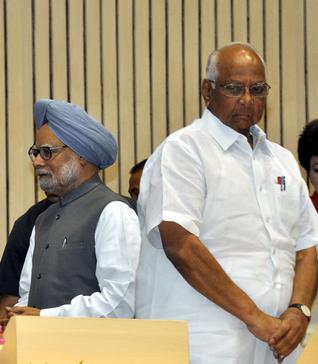
New Delhi, July 20: Reaching out to sulking NCP chief Sharad Pawar, Prime Minister Manmohan Singh on Friday hailed him as a “very valued colleague” and said his knowledge, wisdom and experience are a “great asset” to his government.
Dr. Singh spoke to Mr. Pawar on Thursday night after he, along with party colleague Praful Patel, skipped the Cabinet meeting, apparently unhappy over denial of number two status in the government.
“Mr Sharad Pawar is a very valued colleague of mine whose knowledge, wisdom and experience are a great asset to our government,” Dr. Singh said in a statement to PTI.
The Prime Minister’s statement came after Mr. Pawar met Congress president Sonia Gandhi and his party stated that it had “serious issues” over the functioning of the government and the coalition.
“We are unhappy with some aspects which have been raised by Pawar in personal meetings with Prime Minister Manmohan Singh and Sonia Gandhi,” Mr. Praful Patel, NCP leader and Heavy Industries Minister, said after the party’s confabulations.
Mr. Patel, however, said NCP continues to be an “integral” part of the UPA.
Congress General Secretary Digvijay Singh sought to mollify Mr. Pawar. “In a Parliamentary democracy, all are equal in Cabinet. The Prime Minister is first among equals and there is no number two or number three.”




Comments
Add new comment